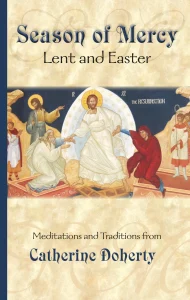THE holy Chrism, used by the Church according to apostolic tradition, is made of olive oil mingled with balm, which, among other things, are emblematic of two virtues very specially conspicuous in our Dear Lord Himself, and which He has specially commended to us, as though they, above all things, drew us to Him and taught us to imitate Him: “Take My yoke upon you, and learn of Me, for I am meek and lowly in heart.”
Humility makes our lives acceptable to God, meekness makes us acceptable to men. Balm, as I said before, sinking to the bottom of all liquids, is a figure of humility; and oil, floating as it does to the top, is a figure of gentleness and cheerfulness, rising above all things, and excelling all things, the very flower of Love, which, so says S. Bernard, comes to perfection when it is not merely patient, but gentle and cheerful. Give heed, then, daughter, that you keep this mystic chrism of gentleness and humility in your heart, for it is a favourite device of the Enemy to make people content with a fair outside semblance of these graces, not examining their inner hearts, and so fancying themselves to be gentle and humble while they are far otherwise. And this is easily perceived, because, in spite of their ostentatious gentleness and humility, they are stirred up with pride and anger by the smallest wrong or contradiction.
There is a popular belief that those who take the antidote commonly called “Saint Paul’s gift,” do not suffer from the viper’s bite, provided, that is, that the remedy be pure; and even so true gentleness and humility will avert the burning and swelling which contradiction is apt to excite in our hearts. If, when stung by slander or ill-nature, we wax proud and swell with anger, it is a proof that our gentleness and humility are unreal, and mere artificial show. When the Patriarch Joseph sent his brethren back from Egypt to his father’s house, he only gave them one counsel, “See that ye fall not out by the way.”
And so, my child, say I to you. This miserable life is but the road to a blessed life; do not let us fall out by the way one with another; let us go on with the company of our brethren gently, peacefully, and kindly. Most emphatically I say it, If possible, fall out with no one, and on no pretext whatever suffer your heart to admit anger and passion. S. James says, plainly and unreservedly, that “the wrath of man worketh not the righteousness of God.”
Of course it is a duty to resist evil and to repress the faults of those for whom we are responsible, steadily and firmly, but gently and quietly. Nothing so stills the elephant when enraged as the sight of a lamb; nor does anything break the force of a cannon ball so well as wool. Correction given in anger, however tempered by reason, never has so much effect as that which is given altogether without anger; for the reasonable soul being naturally subject to reason, it is a mere tyranny which subjects it to passion, and whereinsoever reason is led by passion it becomes odious, and its just rule obnoxious. When a monarch visits a country peaceably the people are gratified and flattered; but if the king has to take his armies through the land, even on behalf of the public welfare, his visit is sure to be unwelcome and harmful, because, however strictly military discipline may be enforced, there will always be some mischief done to the people. Just so when reason prevails, and administers reproof, correction, and punishment in a calm spirit, although it be strict, every one approves and is content; but if reason be hindered by anger and vexation (which Saint Augustine calls her soldiers) there will be more fear than love, and reason itself will be despised and resisted.
The same Saint Augustine, writing to Profuturus, says that it is better to refuse entrance to any even the least semblance of anger, however just; and that because once entered in, it is hard to be got rid of, and what was but a little mote soon waxes into a great beam. For if anger tarries till night, and the sun goes down upon our wrath (a thing expressly forbidden by the Apostle ), there is no longer any way of getting rid of it; it feeds upon endless false fancies; for no angry man ever yet but thought his anger just. Depend upon it, it is better to learn how to live without being angry than to imagine one can moderate and control anger lawfully; and if through weakness and frailty one is overtaken by it, it is far better to put it away forcibly than to parley with it; for give anger ever so little way, and it will become master, like the serpent, who easily works in its body wherever it can once introduce its head. You will ask how to put away anger. My child, when you feel its first movements, collect yourself gently and seriously, not hastily or with impetuosity. Sometimes in a law court the officials who enforce quiet make more noise than those they affect to hush; and so, if you are impetuous in restraining your temper, you will throw your heart into worse confusion than before, and, amid the excitement, it will lose all selfcontrol. Having thus gently exerted yourself, follow the advice which the aged S. Augustine gave to a younger Bishop, Auxilius. “Do,” said he, “what a man should do.”
If you are like the Psalmist, ready to cry out, “Mine eye is consumed for very anger,” go on to say, “Have mercy upon me, O Lord;” so that God may stretch forth His Right Hand and control your wrath. I mean, that when we feel stirred with anger, we ought to call upon God for help, like the Apostles, when they were tossed about with wind and storm, and He is sure to say, “Peace, be still.” But even here I would again warn you, that your very prayers against the angry feelings which urge you should be gentle, calm, and without vehemence. Remember this rule in whatever remedies against anger you may seek. Further, directly you are conscious of an angry act, atone for the fault by some speedy act of meekness towards the person who excited your anger. It is a sovereign cure for untruthfulness to unsay what you have falsely said at once on detecting yourself in falsehood; and so, too, it is a good remedy for anger to make immediate amends by some opposite act of meekness. There is an old saying, that fresh wounds are soonest closed.
Moreover, when there is nothing to stir your wrath, lay up a store of meekness and kindliness, speaking and acting in things great and small as gently as possible. Remember that the Bride of the Canticles is described as not merely dropping honey, and milk also, from her lips, but as having it “under her tongue;” that is to say, in her heart. So we must not only speak gently to our neighbour, but we must be filled, heart and soul, with gentleness; and we must not merely seek the sweetness of aromatic honey in courtesy and suavity with strangers, but also the sweetness of milk among those of our own household and our neighbours; a sweetness terribly lacking to some who are as angels abroad and devils at home!
For other chapters of the Introduction to the Devout Life audiobook visit here –


 Repentance and Forgiveness
Repentance and Forgiveness





